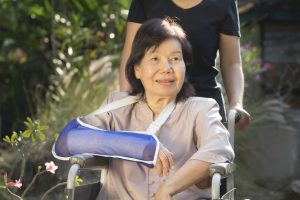
Dr. Robert Glatter, an emergency physician at Lenox Hill Hospital, explained that falls “represent a major source of disability and can lead to prolonged recoveries and lengthy stays in hospitals and long-term care facilities.”
Fractures and wounds in seniors are slower to heal, meaning that falls can be disabling or life-threatening. Having regular vision checks are essential for fall prevention as corrective lenses and other interventions can be implemented in order to reduce the risk of poor vision-related falls. Glatter added, “Monitoring changes in visual acuity is a critical aspect of screening in older persons who live independently, for fall risk – especially if they use canes or walkers.”
The latest studies were conducted by researchers at the CDC who found that the risk of poor vision-related falls has drastically increased from 28 percent to 47 percent.
The risk of poor vision-related falls could jump even higher when other health issues and chronic illnesses come into play.
Dr. Gisele Wolf-Klein who directs geriatric education at Northwell Health in New Hyde Park compiled a list of useful tips in order to reduce the risk of falls associated with poor vision.
- Have a family member or a friend come to take a “fresh look” at your home – they may point out an obstacle you hadn’t identified, such as a throw rug or cable on the floor, which might cause you to trip.
- Replace light bulbs to provide you with good lighting in all the rooms, staircases, and hallways that you use.
- Make sure your prescription lenses have been recently upgraded by your ophthalmologist and avoid bifocal lenses, unless absolutely necessary.
- Check the soles of your slippers: if they are worn out, replace them.
- Rearrange your furniture so that your most needed items are within easy reach of your favorite chair.
- Unclutter your home and dispose of items that are no longer meaningful to you.
- Be careful of slippery surfaces in your kitchen and in your bathroom.
- Consider having an occupational therapist advise you on how to professionally safe-proof your home with grab bars and non-skid equipment.
- Participate regularly in an exercise balance program, such as Tai Chi.
- Get a Life Alert system to summon help in the event of a fall.
Also, read Bel Marra Health 5 tips for better vision.